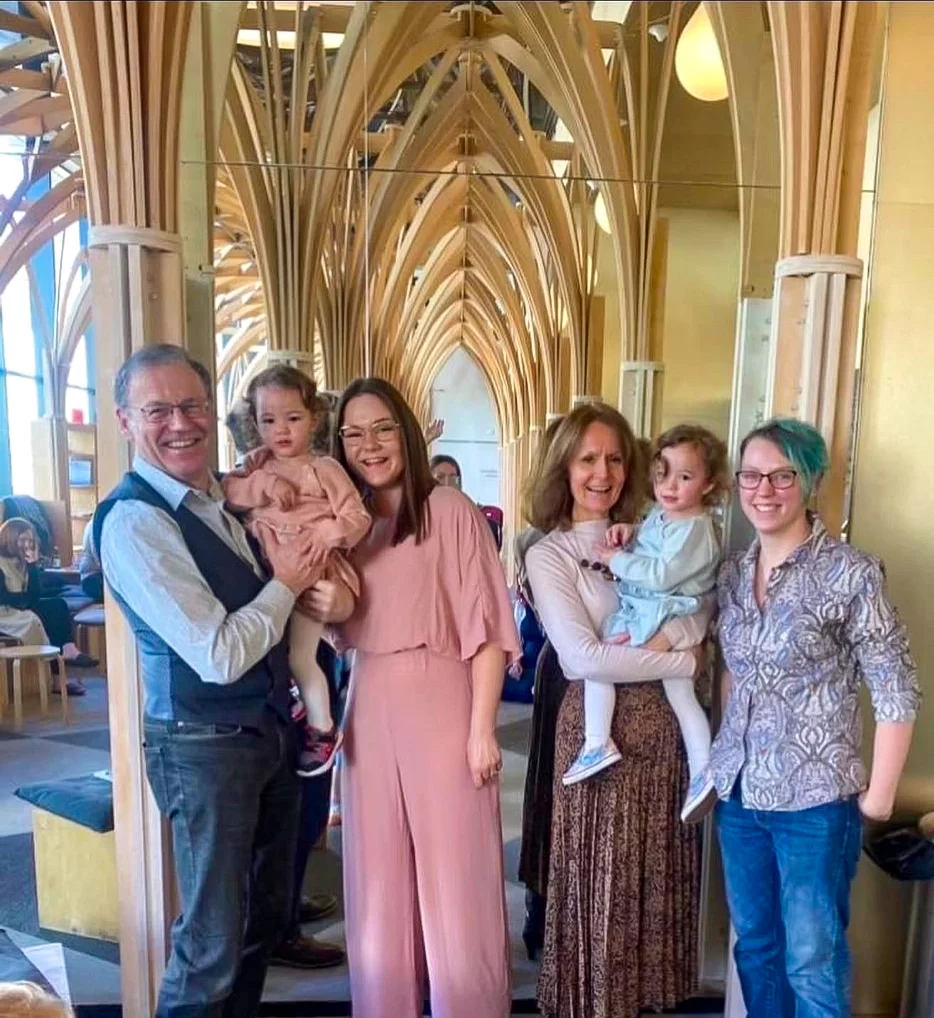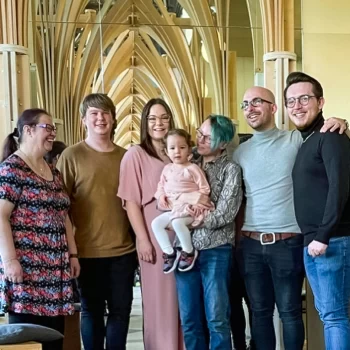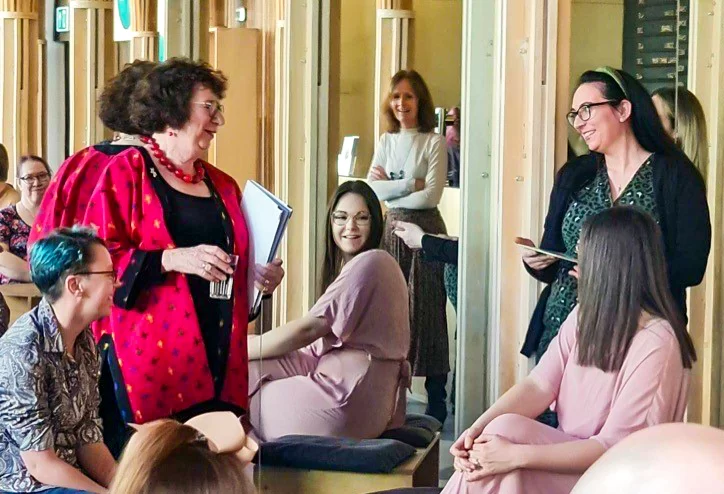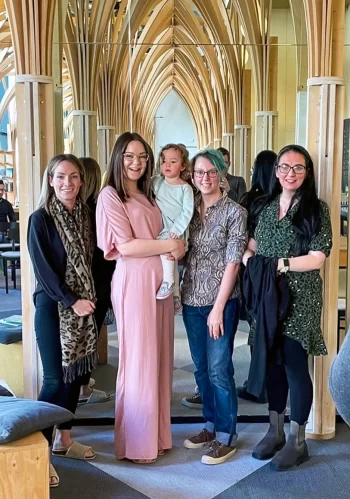Tanya and her partner Steff met as teenagers, married in their twenties and now are proud mums to identical twins, Hazel and Emberly. Tanya explains why they chose a humanist naming ceremony, as an alternative to a christening, to welcome their girls into the world.
A non-religious christening

‘I’d never even been to a naming ceremony before, only christenings, but I knew I wanted to formally introduce Emberly and Hazel to the family, and to give them a support network.
‘I was very close to one of my godparents when I was growing up and I wanted our girls to have non-parent, adult figures to turn to. It had been a long journey, with IVF as the final part, so we wanted to celebrate that we finally got there – and it was all worth it!
‘Steff was always more spiritual than me, but not religious. When she found out about humanism, it felt natural to her. She found in it values that she connected with, without the negative stuff. As a same-sex couple we’ve been very wary of religion. In humanism there are no tenets that could be interpreted as homophobic. They accepted our family from the get-go.’
‘We’re having identical twins!’

‘We did IVF the summer after we got married. It was very successful. We had eight embryos but they put only one back. It was a shock at the six-week scan to find out that one of the embryos had split – we were having identical twins!
‘We spent ten days in hospital after they were born and left the day before lockdown started. When we went into hospital, the world was normal, but we came out to a ghost town, because of Covid.
‘However, it worked well for us as Steff had six months at home on furlough. For the first six weeks, we sat on the sofa, a baby on each lap. It was all naps, Netflix and nappy changes.’
However, lockdown restrictions meant that Tanya and Steff’s plans for their babies’ naming day had to keep changing.
‘We wanted to do it when they were three months old, so we could introduce them to the family. Then we thought, their first birthday – but we weren’t allowed to do anything with people outside our bubble. We ended up having the naming ceremony on their second birthday.’
The twins still talk about their naming day

The fact that the twins were no longer babies meant that they could be included in planning the naming ceremony. Like many parents, Tanya and Steff decided to combine the ceremony with their children’s birthday party.
‘The girls chose the guest list. There were some people we knew would be there, but we got them to tell us who they wanted and bit by bit we pieced it together. We chose an open, spacious venue that would be safe for children to run around in. They had a great time. They still talk about the ceremony every time we pass the venue.
‘We knew straight away that our humanist celebrant Felicity was right for us, and we really appreciated how involved she was on the day. She spent time talking to the guests and was in some of the photos. She was really part of the group.
‘We chose four guide parents. Reading is a very important part of our family life, so we asked each guide parent to present the girls with books they loved during the ceremony. The girls treasure them so much. When the girls take it in turns to pick a bedtime story, they remember who gave them each book.’
Three ways to say ‘I love you’

As well as the books, and the personal stories behind them, there was another truly unique part of the ceremony – the words ‘I love you’ spoken in English, French and Japanese.
‘I’ve always been fascinated by French and Steff was obsessed with Japanese as a teenager. Our donor is half-Japanese, so the girls are a quarter-Japanese. We speak all three languages at home on a three-day rotation.
‘English is their primary language, but on “French day” we’ll enjoy French TV and music, and guide them towards their French books at bedtime, the same on Japanese days. We’ll use phrases from those languages whenever we can. Saying ‘I love you’ in English, French and Japanese was so important to have in the ceremony. It’s such a part of our lives, we had to include it.
‘We always want their Japanese heritage to be a natural part of their lives. We want them to have a full picture of themselves. They know that they have a mummy and a mumma and a donor, which is different from their best friend who has a mum and a dad. They know other families which have just one mum or just one dad.
‘What I loved most about having a humanist ceremony was that we could personalise it like that – having the books, our own personal promises, and the words in Japanese and French.
It made it our naming ceremony, not just a ceremony that we were part of.’
Thank you to Tanya and Steff for sharing their story and photos from their ceremony.
Featured celebrant
Felicity Harvest is today’s featured celebrant. As well as naming ceremonies, Felicity is also accredited to deliver funerals and weddings. Based in East Sussex, Felicity was originally a theatre designer and now delivers creative ceremonies with great storytelling, a touch of humour and the occasional tear!
Humanist naming ceremonies
You can find out more about our naming ceremonies here. Each ceremony is non religious and is personal to the family, written and developed in conversation with the parents.
Humanism
How do you know if you’re a humanist? Take our quiz and find out — or watch this short video where Stephen Fry explains humanism.
Find your local celebrant
If you’d like to discuss a humanist naming ceremony, get in touch with a celebrant to find out more. You can find a celebrant near you with our easy-to-use map.





